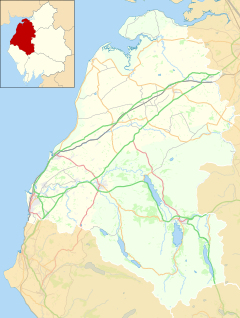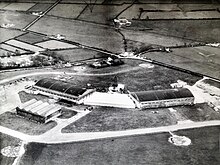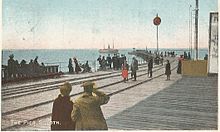
Workington is a coastal town and civil parish at the mouth of the River Derwent on the west coast in Cumberland, Cumbria, England. At the 2011 census it had a population of 25,207.

Maryport is a town and civil parish in Cumbria, England.
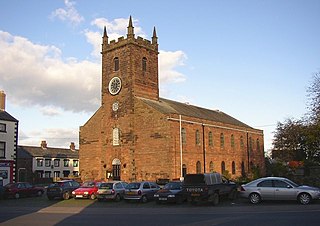
Wigton is a market town in Cumberland, Cumbria, England. It lies just outside the Lake District. Wigton is at the centre of the Solway Plain, between the Caldbeck Fells and the Solway coast. It is served by Wigton railway station on the Cumbrian Coast Line, and the A596 road to Workington. The town of Silloth-on-Solway lies 12 miles (19 km) to the west, beyond Abbeytown.

Abbeytown, also known as Holme Abbey, is a village and civil parish in the Allerdale borough of Cumbria, England.

Bowness-on-Solway is a village in Cumbria, England. It is situated to the west of Carlisle on the southern side of the Solway Firth estuary separating England and Scotland. The civil parish had a population of 1,126 at the 2011 census. The western end of Hadrian's Wall is a notable tourist destination, though the Wall itself is no longer to be seen here above ground. The west end of the Hadrian's Wall Path is marked by a pavilion on the small coastal cliff at Bowness. The village is part of the Solway Coast Area of Outstanding Natural Beauty.

Blitterlees is a small hamlet in the parish of Holme Low, one mile south of Silloth in Cumbria, United Kingdom. The hamlet of Wolsty is located approximately 1 mile (1.6 km) to the south as the crow flies, or 2.25 miles (3.62 km) by road, and Cumbria's county town, Carlisle, is located 23 miles (37 km) to the east. The B5300, known locally as the "coast road", runs through the village on its way to Beckfoot, Mawbray, Allonby, and ultimately Maryport.

Mawbray is a village in the civil parish of Holme St Cuthbert in Cumbria, England. Historically part of Cumberland. It is located on the Solway Plain, 5.2 miles (8.4 km) south west of Silloth, 7.9 miles (12.7 km) north of Maryport, and 25 miles (40 km) west of Carlisle. The B5300, known locally as the "coast road" runs to the west of the village.
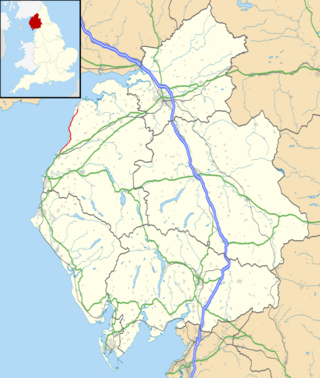
The B5300 is a B road which runs for approximately twelve miles between the towns of Silloth and Maryport in the Allerdale borough of Cumbria, United Kingdom. From north to south, it passes through the villages of Blitterlees, Beckfoot, Mawbray, Dubmill, and Allonby. It runs through the Solway Coast Area of Outstanding Natural Beauty, passes close to the Salta Moss Site of Special Scientific Interest, Milefortlet 21, a Roman archaeological site, the salt pans, a remnant of the Solway plain's medieval saltmaking industry, and the village of Crosscanonby. It is an important route for carrying goods to and from Silloth docks and Maryport harbour. It is also the major road connecting smaller coastal settlements with Maryport and Silloth, from where other roads lead to Workington, Whitehaven, Wigton, and Carlisle. A short section of the road between Dubmill and Mawbray was closed in February 2019 due to coastal erosion, and reopened in June 2019.
There were two interlinked railways on the south shore of the Solway Firth.

Pelutho is a hamlet in the civil parish of Holme St. Cuthbert in Cumbria, historically in Cumberland, England.

Holme Low is a civil parish in the Allerdale borough of Cumbria, United Kingdom. It borders the parishes of Holme St. Cuthbert and Holme Abbey to the south, the town of Silloth-on-Solway to the north-west, and has a short stretch of coastline on the Solway Firth to the west. To the north, it is bordered by lands common to Holme St. Cuthbert, Holme Low, and Holme Abbey, which is an unpopulated area. Holme Low had a population of 373 in 137 households at the 2001 census, reducing slightly in the 2011 Census to a population of 362 in 162 households.

New Cowper is a small hamlet in the civil parish of Holme St. Cuthbert in Cumbria, United Kingdom. It is located three-and-a-half miles south-east of the village of Mawbray, one-and-a-half miles north-west of Westnewton, and twenty-one-and-a-half miles south-west of Carlisle, Cumbria's county town.

Tarns is a small farming settlement in the civil parish of Holme St. Cuthbert in Cumbria, United Kingdom. It is located two miles north-east of the village of Mawbray, and twenty-three miles south-west of Carlisle, Cumbria's county town. The B5301 road runs through the settlement, and along that road the town of Silloth-on-Solway is located five-and-a-half miles to the north, and Aspatria four-and-a-half miles to the south-east. Other nearby settlements include Aikshaw, Goodyhills, Jericho, and New Cowper.

Wolsty is a small hamlet in the civil parish of Holme Low in Cumbria, England. It is located three-and-a-quarter miles south of Silloth-on-Solway, five miles west of Abbeytown, three-and-a-quarter miles north of the village of Mawbray, and twenty-three miles west of Cumbria's county town, Carlisle. The B5300 coast road, which heads north toward Silloth-on-Solway and south to Mawbray, Allonby, and Maryport, is three-quarters of a mile away by road, or less than a quarter of a mile by way of an unpaved farm track.

The B5302 is a B road which runs for approximately twelve-and-a-quarter miles between the towns of Silloth-on-Solway and Wigton in Cumbria, United Kingdom. From west to east, it passes through the villages of Causewayhead, Calvo, Abbeytown, Wheyrigg, and Waverbridge, and also passes near to Blackdyke and Blencogo. At its eastern end, it comes very close to the Solway Coast Area of Outstanding Natural Beauty, and passes by Silloth Airfield, left over from the Second World War. Several of the villages that the road passes through were formerly served by trains on the single-track Carlisle and Silloth Bay Railway, which closed with the Beeching axe in the 1960s. It is the main road connecting Silloth-on-Solway and surrounding settlements with the A596, and by extension, the city of Carlisle.
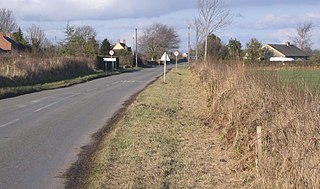
Holme East Waver is a civil parish in Cumbria, United Kingdom. It is bordered to the north by the civil parish of Bowness-on-Solway, to the east by the civil parishes of Kirkbride, Woodside, and Waverton, and to the south by the civil parishes of Dundraw and Holme Abbey, lands common to Holme St. Cuthbert, Holme Low, and Holme Abbey, and the town of Silloth-on-Solway. At the 2001 census, it had a population of 306 in 121 households, increasing slightly at the 2011 Census to a population of 318 in 130 households. It is named for the River Waver, and the rivers Waver and Wampool enter the Solway Firth at the western end of the parish. Part of the Solway Coast Area of Outstanding Natural Beauty is within the parish of Holme East Waver. The largest village is Newton Arlosh.

Kelsick is a hamlet in the civil parish of Dundraw in Cumbria, United Kingdom. It is located approximately 1.8 miles (2.9 km) southeast of Abbeytown, 0.9 miles (1.4 km) northwest of Dundraw, and 14.5 miles (23.3 km) west of Carlisle, Cumbria's county town. Kelsick is accessed by two side-roads off the B5302 road, which runs between Silloth and Wigton.

